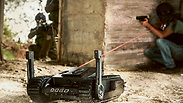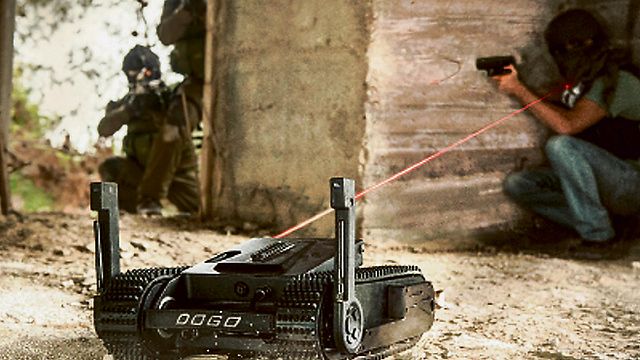In a response to claims made by MK Ayoob Kara (Likud) saying that in two to three years Israel will have indestructible robots to eliminate Hamas, VP and Co-Founder of General Robotics Shahar Gal said that, although very far from the truth, Kara's claims are not entirely detached from reality.
Indeed, according to Gal, this kind of lethal robot has already been built.
"When we heard about the minister's claims we laughed," admitted Gal. "As someone who spent years in the field of robotics I can tell you that no robot could replace our soldiers, at least not in the next few years. Kara's vision of the near future is science fiction. Unfortunately, combatants are not going to be out of harm's way, but robots will certainly assist in the battle."
General Robotics is an Israeli company that specializes in developing robots for military use. Shahar Gal's father, Ehud Gal, serves as its CEO and has served as a colonel in the IDF. He was the VP of the Defense Ministry's Weapon and Technological Infrastructure Research and Development Agency.
It is the same company that developed the Aiball—a spy camera that enables military units to gain a viewpoint into buildings before clearing them of terrorists.
About a year ago the company developed DOGO, a small robot that is intended for short range combat.
The robot, which was launched in June 2016, has already been purchased by dozens of counter-terrorism units in Israel and abroad.
As opposed to heavier robots that are designed for the purpose of bomb defusal, the DOGO weighs a mere 11 kilograms (24 pounds) and is considered to be the lightest combat robot in the world.
It is equipped with eight cameras that supply its operator, who uses a special tablet to control it, a 360 degree sight range, even at night.
Morevoer, it also has caterpillar tracks that allow it to climb over obstacles and travel in difficult terrain.
What makes the DOGO unique, though, is the fact that it's armed with a 9mm GLOCK 26 pistol capable of carrying 14 rounds of ammunition. It can even fire non-lethal rounds according to the requirements of any given mission.
The weapon is protected inside a special secure vault to prevent it from ending up in enemy hands.
The robot essentially serves as an extension for the operating combatant, who will be able to neutralize their target without exposing themselves to danger. In most cases the enemy won't even know that the little rolling assassin has firepower capabilities since the weapon is concealed.
In addition, the robot's operator can also communicate with the enemy in sight using a special speaker, allowing for negotiations prior to shots being fired or to confuse him with simulated noises and distractions, like barks or sirens.
Theoretically, the robot is so small that if caught by a terrorist before it manages to inflict damage, it can simply be picked up thrown to one side. In such a case, soldiers operating in close proximity to the conspicuous gadget will at least be aware that their target is distracted, allowing them to quickly close in on the bewildered enemy.
"Our aim is that the enemy combatant will deal with the robot and not the soldiers," explained Gal, adding that "the DOGO is intended for the last 50 meters of a scene involving terrorist holding hostages."
According to Gal, many lives could have been saved if the DOGO was used in recent terror attacks in Paris, Dallas and more.
But what happens if the DOGO, which costs $100,000, is put out of service after being shot or broken in some way? Gal said that in such a scenario, the client will be granted a new robot, saying "I don’t want it to not be used for fear that it will be damaged, just the opposite."
According to Gal, counter-terrorism units abroad are already training with the DOGO but have not yet used it in the field. "It is just a matter of time, and I'm pretty sure it is going to save lives."


















